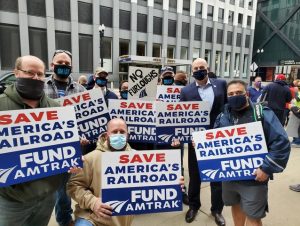In its preliminary financial report, Amtrak said that the COVID-19 pandemic has reduced ridership on the national passenger carrier by about 75% from pre-COVID levels.
While Amtrak leadership expects a slow rebound in ridership, with forecasts seeing an increase to about 40% of pre-pandemic levels by the close of the 2021 fiscal year as COVID-19 abates, the coronavirus has been a massive shock to the carrier.
“Our dedicated employees continue to work tirelessly through the pandemic to keep this country moving, advance critical infrastructure and update technology and services, and provide safe transportation to customers,” said Amtrak President & CEO William Flynn. “However, without additional funding for 2021, we will be forced to further reduce service, defer critical capital projects and make more job reductions despite this important progress.”
The Republican-controlled Senate did not act on a pair of bills — the HEROES Act and the Moving Forward Act — passed by the U.S. House of Representatives that would have provided additional emergency funding for Amtrak to maintain employment and service levels as the nation continues to cope with the coronavirus. Instead, funding was maintained at 2020 levels by Congress.
In reaction to not having the nearly $5 billion needed to maintain operations, carrier leadership reduced daily long-distance routes to three trips a week and cut about 2,000 unionized employees effective Nov. 1 over the objections of SMART-TD and other unions representing Amtrak workers.
The carrier had expected to break even for the first time in its history during the 2020 fiscal year, which ran from Oct. 2019 to Sept. 2020.
Read the carrier’s report.
Tag: Amtrak President William Flynn
Amtrak’s financial situation and the freight rail industry’s continued use of Precision Scheduled Railroading (PSR) practices were the focus of a U.S. Senate Commerce Committee hearing Oct. 21.
Amtrak President and CEO William Flynn repeated his plea for almost $5 billion in emergency funding to help the nation’s passenger carrier weather the continued downturn in ridership caused by the COVID-19 pandemic. The carrier has made drastic long-distance service cuts, going from daily to three trips per week on many routes. Furloughs for almost 2,000 Amtrak employees are scheduled to take effect in November.
“Virtually all of the CARES Act money has been spent,” Flynn told the committee. “These workforce adjustments are essential with current financial funding.”
A number of legislative actions, including the HEROES Act and the INVEST in America Act, while passed by the U.S. House of Representatives, have been stalled by Majority Leader Mitch McConnell in the GOP-controlled Senate. The emergency funding provided by such legislation would help the carrier rebound, Flynn said.
“Once the pandemic eases, Amtrak plans to grow,” he said.
A second panel featured a discussion of PSR.
Rudy Gordon, CEO of the National Grain and Feed Association, expressed concerns from a shipper perspective about the redeployment of furloughed railroad workers, saying that he fears delays in service and shipments on the part of rail carriers when the economy rebounds.
PSR has caused “a tipping point” at the expense of customer service, Gordon said, and said that if rail service erodes further at the expense of the carriers obtaining lower operating ratios (ORs) that the Surface Transportation Board should intervene.
Larry Willis, president of the AFL-CIO Transportation Trades Department (TTD), of which the SMART Transportation Division is a member, offered written testimony concerning PSR.
“Across the sector, the pandemic continues to wreak havoc, threatening both the health and livelihoods of employees,” Willis stated. “At the same time, freight railroads, at the insistence of Wall Street investors and hedge fund managers, have pursued operating practices that undermine basic tenets of rail safety, ask frontline workers to do more with less, and threaten the reliable and efficient customer service that should be the hallmark of this industry.”
The lone labor representative invited to testify in person was Dennis Pierce, president of the Teamsters Rail Conference.
Other industry stakeholders appearing were:
- Paul Tuss, executive director, Bear Paw Developing Corporation and Member, Montana Economic Developers Association
- Frank Chirumbole, vice president global supply chain, Olin Corporation on behalf of American Chemistry Council
- Kent Fountain, chairman, National Cotton Council
- Ian Jefferies, president and chief executive officer, Association of American Railroads
